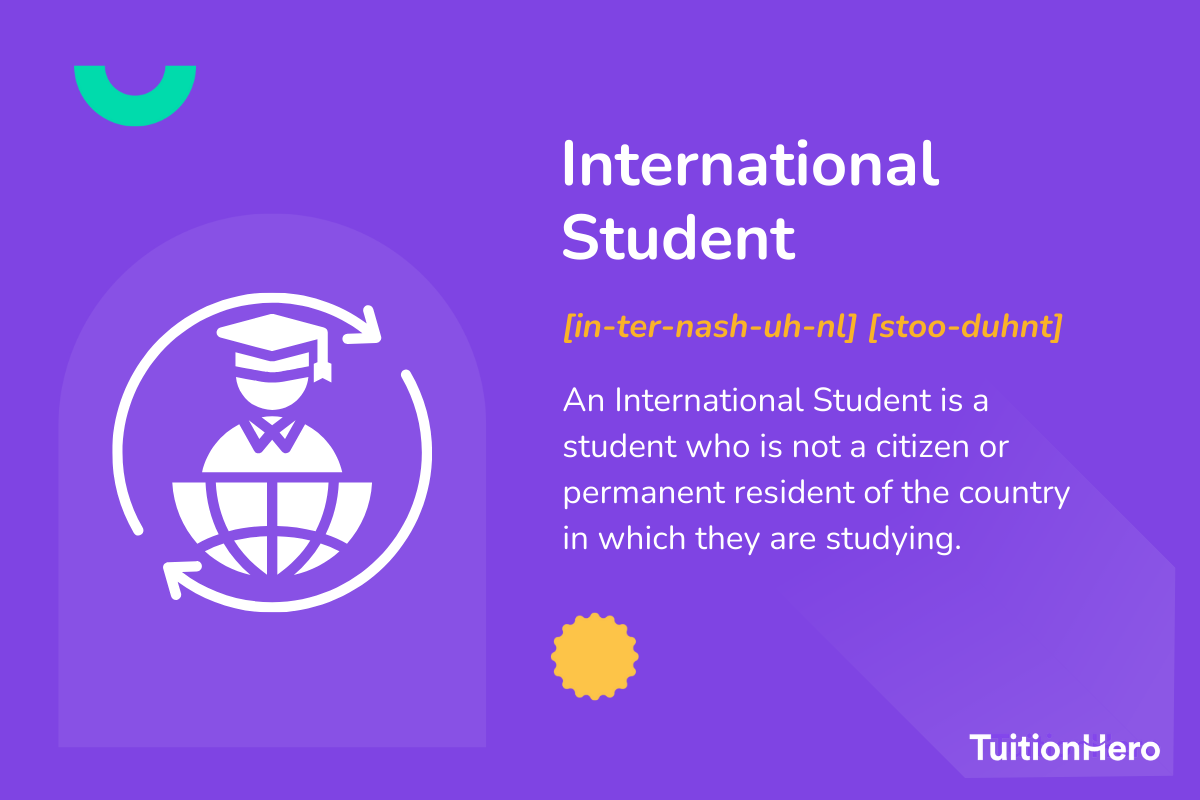Advertiser Disclosure
Last update: November 16, 2024
7 minutes read
How to Determine if You Are an International Student
Are you navigating U.S. college as an international student? Learn the key factors that determine your status and options.

By Brian Flaherty, B.A. Economics
Edited by Rachel Lauren, B.A. in Business and Political Economy
Learn more about our editorial standards



By Brian Flaherty, B.A. Economics
Edited by Rachel Lauren, B.A. in Business and Political Economy
Learn more about our editorial standards
Understanding whether you're considered a domestic or international student is crucial for college finance, as it affects things like scholarships, loans, and work opportunities. This post will help you figure out if you're an international student and cover other important details you need to know.

Key takeaways
- Visa types dictate your eligibility for work and access to certain financial services
- Scholarships, private loans, and credit options exist for international students
- Building a support network can encourage your cultural and academic adaptation
What defines an international student?
Citizenship and residency
- You're not a U.S. citizen or permanent resident: This is the primary indicator. International students are typically those who hold citizenship from countries outside the United States and do not have permanent residency (green card) in the U.S.
- You're on a visa: If you're in the U.S. on a student (F1 or M1) or exchange visitor (J1) visa, you fit the international student category.
- Dual citizenship considerations: If you have U.S. citizenship along with citizenship from another country, you are not considered an international student.

Financial aid implications
Understanding how being an international student affects your financial aid package is crucial.
- Limited access to federal financial aid: Generally, international students can’t access federal grants and loans, but there are exceptions for eligible non-citizens.
- Scholarship opportunities might differ: Some scholarships are specifically designed for international students. It's important to research and apply for these opportunities. Learn more about scholarships here.
- Securing work can be challenging: International students may face restrictions on work opportunities while studying in the U.S. depending on visa restrictions.
Educational background and language proficiency
- High school education outside the U.S.: If your secondary education was completed in a country other than the United States, you might not have the same foundational knowledge expected of domestic students.
- English language proficiency tests: International applicants may need to take the TOEFL or IELTS to prove their English proficiency before enrolling in a college.
The effect on your college experience
Most universities have dedicated offices that provide support services to international students, including visa assistance, cultural adaptation, and academic advising. Being an international student offers a rich opportunity for cross-cultural exchange, but comes with its own set of challenges relating to adaptation and integration.
Navigating financial solutions for international students
While federal loan options might be limited, international students can explore private student loans and refinancing options. Understanding the ins and outs of student loans is essential.
For international students, starting to build a credit history in the U.S. can be beneficial, especially if you plan to work or stay in the country post-graduation.

TuitionHero Tip
By accurately identifying whether you're an international student, you can make informed decisions about funding your education effectively.
More considerations for international students
While we have already touched on visa classifications, it's crucial to dive deeper into the specifics of maintaining your status. International students must follow strict guidelines to keep their visa valid, including, but not limited to, enrollment in a full course of study and limited on-campus employment.
Maintaining your legal status involves more than just staying enrolled. You must also make sure you don’t violate the terms of your visa with unauthorized work, or fail to update your address with USCIS.
While options are limited, programs like Optional Practical Training (OPT) and Curricular Practical Training (CPT) allow for some work opportunities in your field of study that align with visa restrictions. Understanding these options early on can significantly affect your post-graduation plans - make sure to speak to your university about their specific requirements.
Adjusting to the American classroom
The American educational system and classroom culture might differ from what you're used to. Active participation and critical thinking are usually encouraged, affecting how you're expected to engage with instructors and peers.
Active participation can be a big part of your grade in many American classrooms. It's essential to feel comfortable sharing your thoughts and asking questions.
Understanding the strict policies on plagiarism and academic honesty is crucial. The standards might differ from those in your home country, and unintentional mistakes can have serious consequences.
Financial planning and budgeting
Given the limited access to federal financial aid, creating a comprehensive budget is vital for international students. Consider all your expenses, including tuition, housing, food, insurance, and personal spending.
The cost of living can vary dramatically between different parts of the U.S. Research the typical living costs in your university's area to plan more effectively. It's worth exploring scholarships offered by your institution or external organizations, part-time work opportunities on campus, and sponsorships or loans from your home country.
Compare private student loans now
TuitionHero simplifies your student loan decision, with multiple top loans side-by-side.
Compare Rates
Cultural adaptation and support networks
Adjusting to life in a new country can be challenging. Universities offer many resources to help international students adapt, including counseling services, international student organizations, and cultural adaptation workshops.
Joining student organizations and participating in campus events can help you meet others who share your interests or are facing similar challenges. Make the most of the resources your university offers. International student offices can provide guidance on everything from legal questions to finding housing.
Dos and don'ts for international students
Do
Do research scholarships
Do maintain your visa status
Do build a support network
Do seek university resources
Don't
Don't violate visa terms
Don't rely solely on federal aid
Don't procrastinate on financial planning
Don't isolate yourself

Advantages and disadvantages of being an international student
Understanding your status as an international student is essential for navigating U.S. colleges. Here, we outline the main advantages and disadvantages, helping you prepare for your academic journey.
- Diverse scholarships: Access to scholarships specifically designed for international students.
- Cultural exchange: Opportunities for cross-cultural exchange and building a global network.
- Support services: Dedicated university offices providing visa assistance, cultural adaptation, and academic advising.
- Language proficiency: Improvement in English language skills through immersive experiences.
- Personal growth: Enhanced personal growth and resilience through adapting to a new environment.
- Limited federal aid: Ineligibility for most federal grants and loans.
- Visa restrictions: Restrictions on work opportunities and the need to maintain visa status.
- Financial challenges: Higher tuition fees and the need for meticulous financial planning and budgeting.
- Adaptation difficulties: Challenges in adapting to different educational systems and classroom cultures.
- Legal obligations: Strict guidelines to maintain legal status, including full-time enrollment and limited on-campus employment.

Why trust TuitionHero
At TuitionHero, we make studying in the U.S. easier for international students. We help you find money for school, connect you with loan options, and help you get scholarships. Plus, we guide you through the FAFSA process and share information on student-friendly credit cards. If you're an international student, we're here to help you understand your financial options better.
Frequently asked questions (FAQ)
Many scholarships aim specifically at helping international students. Their criteria vary widely, covering academic merit, financial need, and fields of study.
At TuitionHero, we know how important financial support is, which is why we connect students to a variety of scholarship opportunities. By exploring our scholarships page, you'll find an array of options tailored to meet the unique needs of international students.
Building credit in the U.S. is crucial for international students, especially if they plan to work, live, or obtain loans in the country after graduation. One effective way to start this process is by securing a student-friendly credit card designed for people without an established credit history.
At TuitionHero, we help students identify reputable lenders offering credit cards with features tailored to their unique needs. Starting this financial journey with the right credit card can set the foundation for a healthy credit score, opening up many possibilities in the future.
International students usually wonder about their eligibility for work-study programs in the United States. While direct participation in federally funded work-study programs is limited, there are other ways international students can get a part-time job on campus.
These opportunities are a source of income and also offer valuable work experience. For a deeper understanding of work-study programs and options available to international students, visiting TuitionHero's federal work-study program page will provide guidance and clarity.
The type of visa an international student holds can greatly affect their eligibility for many student loan options. While federal student loans are generally restricted, there are private lenders that offer loans to students on specific visa types, with conditions usually attached. At TuitionHero, we help students navigate private student loans, ensuring they identify and apply for the best options suited to their visa status and financial needs.
Whether or not undocumented students count as international students is a tricky question. For the purposes of the FAFSA, the Department of Education typically considers undocumented students equivalent to international students, meaning they’re not eligible for federal aid.
Individual schools have their own policies, though. Undocumented students may or may not be eligible for the same institutional aid as international students depending on the institution's rules.
Final thoughts
Determining whether you're an international student and understanding the nuances that come with it plays a big role in navigating your college journey in the U.S. effectively. Understanding visa rules and finding financial support can be hard but worth it. Even though it's tough, being an international student brings lots of chances to learn and grow.
Remember, you can check out TuitionHero for advice and support. Let's make your dream of studying in the U.S. come true. For more insights, visit our page on strategies for international student loans.
Source
Author

Brian Flaherty
Brian is a graduate of the University of Virginia where he earned a B.A. in Economics. After graduation, Brian spent four years working at a wealth management firm advising high-net-worth investors and institutions. During his time there, he passed the rigorous Series 65 exam and rose to a high-level strategy position.
Editor

Rachel Lauren
Rachel Lauren is the co-founder and COO of Debbie, a tech startup that offers an app to help people pay off their credit card debt for good through rewards and behavioral psychology. She was previously a venture capital investor at BDMI, as well as an equity research analyst at Credit Suisse.
At TuitionHero, we're not just passionate about our work - we take immense pride in it. Our dedicated team of writers diligently follows strict editorial standards, ensuring that every piece of content we publish is accurate, current, and highly valuable. We don't just strive for quality; we aim for excellence.
Related posts
While you're at it, here are some other college finance-related blog posts you might be interested in.
Shop and compare student financing options - 100% free!

Always free, always fast
TuitionHero is 100% free to use. Here, you can instantly view and compare multiple top lenders side-by-side.

Won’t affect credit score
Don’t worry – checking your rates with TuitionHero never impacts your credit score!

Safe and secure
We take your information's security seriously. We apply industry best practices to ensure your data is safe.
Finished scrolling? Start saving & find your private student loan rate today





